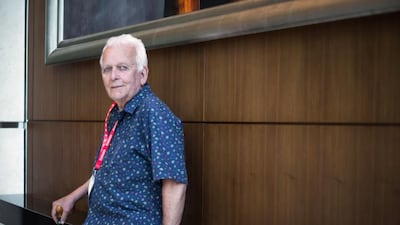He is a master storyteller who single-handedly injected life into lavish costume dramas, and has been responsible for reviving a spate of classics.
At 80, Andrew Davies has been screenwriting for half a century, but is perhaps remembered most for the scene in Pride and Prejudice, where Colin Firth, as Mr Darcy, emerges dripping from a lake. He doesn't mind a bit.
"There was a stage where I was pretty well known in the business but not to the public," the Welsh screenwriter said during the recently concluded Emirates Airline Festival of Literature in Dubai. "After Pride and Prejudice that changed because people started talking about an Andrew Davies adaptation.
“I like it because generally they get well reviewed. If I got a lot of bad reviews, it would be awful to have that notoriety.”
More than 20 years on, his Midas touch has transformed numerous televised classics, mostly for the BBC, from last year's much-acclaimed War and Peace to Bleak House, Vanity Fair and Doctor Zhivago.
Think of any epic TV production and he has had a hand in it – from Mr Selfridge to the British version of House of Cards (he is credited as an executive producer on the US version). He was also a scriptwriter for the first two Bridget Jones films, adapted from Helen Fielding's books, and stipulated a night on the town with the author as research: "It was great fun."
While he is not averse to penning modern screenplays, he is back now doing what he does best: sprinkling his magic over a vast classical tome – this time it is Victor Hugo's Les Misérables – and making its transition into a six-episode extravaganza seem terribly easy.
“I often say adaptation is easy. You just get the book and copy out the best bits,” he says. “There is a bit more to it than that – but sometimes not that much.”
Davies is gloriously good fun; for all his modesty, he is a captivating storyteller with an ability to bring complex novels to life on screen.
“It is really about getting to the essence of a book,” he says. “The usual rule in scriptwriting is to start as late as possible in the scene and get out as early as you can.
“I like listening to the book on audiotape. I drive my car around, listening until I have absorbed it.
“I ask myself: ‘Whose story is it?’ It is a question of reading the book lots of times until it is inside me and kind of part of me.
“I think of the characters as real people. I try to put myself inside them ... it is very nice to have a holiday from being an old bloke.”
Cardiff-born Davies began his career as a teacher, but started writing plays for radio and television in 1964. He began adapting fiction in 1980. “When I started, I wrote all original work. You do not get the job of doing adaptations until you have proved yourself.
“Being a teacher helped a lot because I was spending a lot of time reflecting on these books and thinking about how they work.”
But it was the 1995 adaptation of Pride and Prejudice, for the BBC, which propelled him into the spotlight. It was supposed to reach an audiences of five million, but producers were astonished when double that number tuned in every week.
“It made people sit up and take notice and kickstarted a revival of the old bonnet dramas, which had been in abeyance for a while,” says Davies.
Part of its appeal, he thinks, was moving away from a starchy adaptation into more rounded characters. “A lot of writers are a bit po-faced and too reverent when they adapt. I wrote a pro-Darcy version in which we see him doing lots of manly things like having a bath and diving in his lake.
“He is a well-rounded human being rather than being a stuffed shirt, which is what he looked like in previous adaptations.”
Davies says the golden era of 19th-century writers made his job easier. “Often modern novels are a bit haphazard. The great writers of the 19th century tended to be absolutely brilliant at structuring their novels. I find them easier on the whole.”
Les Misérables fans might be upset with him, though, as he is staying faithful to the original text and moving away from "that awful musical".
“I think it is a wonderful book and I do not think anyone has adapted it in the right way,” he says. “People who love the musical are going to be so angry and think: ‘Who does he think he is?’, but I am trying to rescue it from that awful musical.”
The BBC production of Les Misérables, part-funded by US producer Harvey Weinstein, will start filming next year.
Davies is in talks to adapt Vikram Seth's A Suitable Boy and is hopeful of reviving scripts of Charles Dickens's Dombey and Son, and an original screenplay based on the life of Aneurin Bevan, the Welsh politician who founded Britain's National Health Service.
One thing he never worries about is whether his audience will prefer the book or the TV series.
“They do not actually say that when they see mine. They say: ‘This is wonderfully like the book’.”
artslife@thenational.ae

